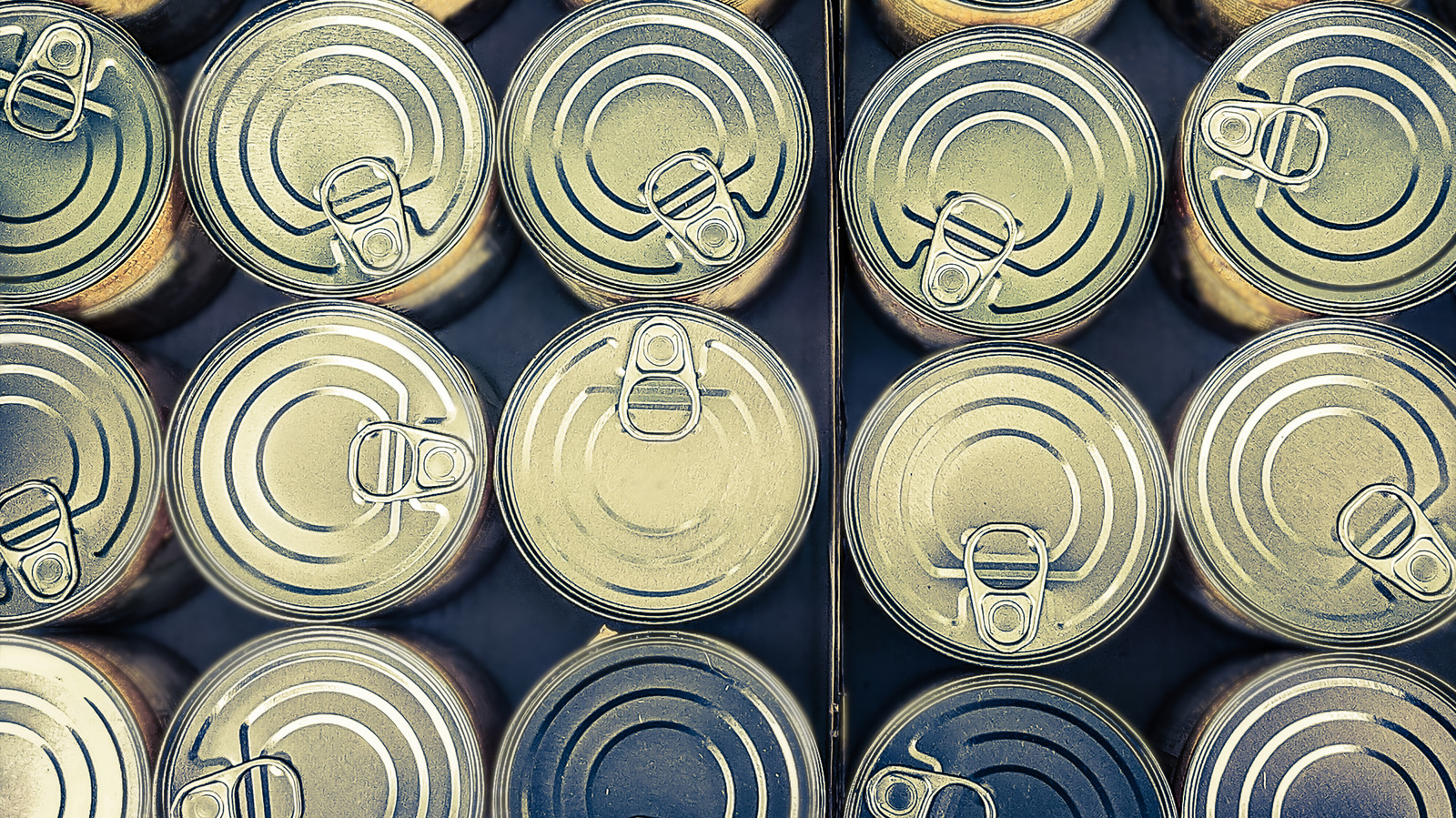In times of crisis, you can always rely on canned food. Sure, canned foods may not be the most gourmet options out there, but they're reliable, long-lasting, and cheap. That last positive — their affordability — is a big draw for customers at the moment.
The first few months of 2025 have been rocked by economic uncertainty, thanks to Trump's endless back-and-forth on tariffs and the escalation of a trade war that threatens to send food prices through the roof. Canned foods, with their extended shelf-life and cost-effectiveness, are seen as a port in the storm of ballooning goods costs. However, that may not be the case for much longer.

While Trump announced a temporary pause on tariffs in April 2025, offering a brief respite to consumers who are already deeply worried about how they're going to pay for their groceries, those tariffs are still planned to go ahead. That means that the cost of a lot of foods are going to creep up pretty soon, including your canned goods. A truckload of everyday canned items may be just as affected as their fresh counterparts, so it's wise to think about stocking up your pantry before they shoot up in price.
We've got all of the items you need to buy right now, right here. 1. Canned tuna Everyone's favorite affordable protein may not be that affordable for much longer.
Buying canned tuna will be more complicated when tariffs are properly introduced, thanks to several countries that the United States sources tuna from being affected. Indeed, some retailers have also started to nudge up their canned tuna prices preemptively, perhaps as a way to safeguard against the economic storm that's about to unfold. Although the U.
S. does have its own domestic tuna industry and a host of fisheries in the Atlantic and Pacific oceans, it also sources the fish from further afield. Countries like Thailand, Vietnam, and Indonesia are big suppliers of canned tuna to the United States, and all of these countries are set to be hit heavily with tariffs.
Vietnam, in particular, may be slapped with a tariff of 46%, which will send the price of any imported fish products flying through the roof. The U.S.
also sources some of its tuna stock from Mexico, which may well be struck by significant tariff action, and from fisheries in the Indian Ocean. While there will likely be a push towards more domestically-produced tuna because of all of this, it won't be instant, and your cans will get more expensive in the short term. 2.
Canned nuts We just love a can of nuts, folks. They stay fresh for way longer than their bagged counterparts, and they're generally much more affordable. Both of those reasons are precisely why you should be buying them now, as pretty soon they'll jump in price — and let's be honest, canned nuts can already set you back a good few dollars anyway.
Although the United States has a large peanut industry, when it comes to other nuts, the country relies heavily on imports from other countries. Some of these countries, like Vietnam, Brazil, Canada, South Africa, and Cote d'Ivoire, are all due to be hit significantly by tariffs. Indeed, one of the leading bodies for nut production in the U.
S., the Peanut and Tree Nut Processors Association , has voiced its worries about tariffs. "PTNPA remains concerned about the impact of the 10% tariffs, in combination with other additional tariffs being applied to PTNPA Member companies across the vast nut industry," said its CEO, Jeannie Shaughnessy.
Not only will the nuts themselves become more expensive, but the equipment needed to harvest and process them and the cans they're housed in will also likely shoot up in price. "Truly, no sector of the nut industry is not impacted by these tariffs," Shaughnessy warned. Yikes.
3. Canned olives A lot has been made of olive oil's potential increase in price because of climate change, but now there's good reason to be worried about further increases because of tariffs too. Olive oil is famously produced in Mediterranean countries, thanks to their favorable climate, robust industry, and sense of prestige — and a lot of those countries are about to have a steep increase in import costs.
The U.S. has introduced 20% "reciprocal" tariffs on EU goods, and although they're subject to a temporary pause, they don't look like they're going to be taken away any time soon.
Is it any surprise, then, that imported canned olives will also be subject to the same tariffs? Probably not. Spain, Greece, and Italy are top import markets for the United States when it comes to olives, and both everyday and more luxurious canned olive products from these countries will be seeing an increase in price. The U.
S. does have a domestic olive operation, but as with so many of its other industries, it's balanced out significantly by exports; due to price competition, it wouldn't be unlikely to see these domestically-made products go up in cost too. Given that the United States also imports fresh olives from Mexico, you can also expect to see your ready-to-eat produce increase in price.
4. Canned tomatoes Virtually every American has a few cans of tomatoes in their pantry, and this cupboard staple is renowned for being an affordable way to bulk out a meal and provide valuable nutrition and flavor. That may not be the case for much longer, thanks to Trump's tariffs.
Tomatoes, much like most other vegetables, are going to be hit pretty heavily by tariffs. Although the bulk of the tariff action will affect fresh produce, canned tomatoes won't be safe from price increases entirely. Turkey and Italy are two notable suppliers of canned tomatoes to the United States, and both countries will see goods exported by them get more expensive for U.
S. consumers. Importantly, too, tariff action may still affect tomatoes that are canned in the United States.
If the raw product is imported, it will still be subject to a tariff margin, which will make the cost of producing canned tomatoes for any American companies higher. As a consequence, it's likely that they'll have to raise their prices and pass the cost onto the customer. We'd stock up now before things blow out of proportion, folks.
5. Canned soup When you're feeling low, sick, or just a little bit lacking in money, canned soup is always there. This meal is reliably cheap and it's easy to upgrade canned soup into something more special .
While it may not be the most exciting thing to chow down on, you can feel safe that you're not blowing your budget. Unfortunately, that may no longer be true once the tariffs well and truly kick in. The problem with canned soup is that it's made with a variety of ingredients, which are all interconnected and part of the vast global trade matrix that Trump has well and truly disrupted with his tariffs.
Take Campbell's Chunky Beef Soup with Country Vegetables: In just one can, you've got various different types of vegetables, pieces of beef, tomato paste, oils, extracts, and soy sauce. A number of these items will necessarily be imported from different countries — the vegetables might come from Mexico, the beef may come from Canada, and the soy sauce may be imported from various countries in East and Southeast Asia. It's highly unlikely that not a single ingredient will be affected, and you should expect to see even the simplest of canned soups get a little pricier as a consequence.
6. Canned meat Meat is expensive, people, and it's only going to get worse from here. Trump's tariffs on pretty much every country he could think of have sent the meat industry into a tailspin, as producers reckon with the reality of items getting way more expensive.
The U.S. is a big importer of meat from Canada and Mexico — and while both of them are massive suppliers of cattle, the pork industry may also be affected, thanks to Canada's supply of piglets to the United States.
All of this means that all types of meat, including the canned variety, will likely get more expensive pretty quickly. Even where the U.S.
has produced canned meat on its own soil, it likely will have had to purchase some or all of the product from overseas or across borders, making the raw cost of making the items more expensive. Beef is already a victim of inflation , and other meats will soon be more costly too. The one product that may be less affected is canned chicken, thanks to the United States' well-established domestic poultry industry.
However, canned chicken could still see a significant knock-on effect from other price increases, as customers flock (if you'll excuse the pun) to the product as a cheaper source of protein, which could cause food companies to jack up the price. 7. Canned legumes When you're unsure about what to add to your stew or chili, a good can of beans will usually do the trick.
You should always have canned beans and legumes on hand as an affordable source of protein and fiber — but that may not be the case much longer. The United States imports a massive amount of beans to its shores from overseas. In 2023, the country imported more than $250 million of this product, with Mexico, Guatemala, and Canada being notable trading partners.
All of these countries have been hit with tariffs that will soon kick into action. The U.S.
is also a big importer of lentils, with Canada, India, and Turkey operating as big suppliers. Tariffs on Indian goods could be as high as 27% when they kick in permanently, and who knows if they're going to go any higher than that. Even if your canned beans or lentils proclaim that they were canned in the USA, too, they may still be more expensive.
After all, where do you think the company got the legumes from in the first place? The good news is that canned beans have a shelf life of two to five years, so we'd recommend stocking up on them now. 8. Canned chile peppers Canned chile peppers are the perfect way to hack your meal.
With just a crank of a can opener, you can add immediate spice, flavor, and depth to pretty much anything you're making. Unfortunately, though, you'll have to pay a higher price for this convenience pretty soon, once the tariffs kick in. Anaheim and poblano chile peppers are imported to the United States from various places around the world as a way to bolster domestic production, and even if they're canned in the U.
S., the raw materials are still subject to higher prices. It's not just spicy canned chile peppers that might be more expensive soon, too.
Fire-roasted canned bell peppers may also be pricier thanks to tariff action, due to the United States importing various different types to its shores. You may also find that paprika, which is derived from dried, ground peppers, burns more of a hole in your pocket. Canned, sliced jalapeños will also likely make your shopping bill a little harder to stomach.
Sorry, folks: You'll have to stump up for all of that flavor. 9. Canned pasta There's something about canned pasta that feels distinctly American — and indeed, a lot of the time it is.
Massive canned pasta manufacturers like ConAgra operate and create products in the U.S., so you might think that these companies and their products are immune to the impact of tariffs.
However, that's not the case. ConAgra itself has voiced concerns that it will have to hike its prices, due to the increased cost of many of the ingredients that go into making items like its Chef Boyardee pasta. ConAgra has flagged that items like olive oil, palm oil, tomatoes, and other vegetables in its products could be subject to price rises, and it's been pretty clear about where they're going to make up that shortfall.
"I will look at everything from getting more out of our productivity programs, to (seeing) if there's an alternative source of supply that is lower cost, said CEO Sean Connolly (via Reuters ). "But we'll also look at targeted pricing because, at the end of the day, we have to protect our margin structure." Even the steel used to make the canned pasta containers could be getting more expensive, which will mean that you'll have even more to pay.
10. Canned pineapple It's probably no massive secret that pineapples aren't widely grown in the United States of America. While you can find pineapple farms and production in Southern states like Florida and California, as well as Hawaii and Puerto Rico, a huge chunk of the pineapple market comes from Central and South American countries.
Costa Rica, Mexico, Honduras, and Ecuador are all large suppliers of pineapples to the U.S., and there are smaller imports from countries like Thailand, the Philippines, and China.
As you can probably guess by now, those pineapples are all going to be subject to tariffs — and canned pineapple won't escape. Whether it's canned domestically or abroad and shipped in, it'll still be more expensive. Other forms of pineapple, like fresh and dried pineapple, will also see a steep price increase.
If we were you, we'd stock up on canned pineapple as soon as possible. You may also want to buy other canned tropical fruit while you're at it, as these will also likely become more expensive. 11.
Canned beer We hate to be the ones to tell you this, folks, but your canned beer is probably about to get way pricier. Imported beer in aluminum cans could soon be subject to a significant tariff, due to the very container it comes in. The price hike on beer first appeared in a highly confusing annex released by the Department of Commerce, which seemed to indicate that all beer, regardless of the container, would face a 25% price increase.
Brewers were immediately thrown into a tailspin at the potential impact this could have on their business — and honestly, we don't blame them. A Department of Commerce representative soon clarified the situation, stating to POLITICO that "tariffs on imported beer only apply to the value of the aluminum content of the beer can, and not to the beer itself," adding that, "Imports of the empty aluminum cans will be tariffed for their full value." However, this still means that imported beer cans will be subject to higher pricing.
Additionally, homegrown beer made and canned in the United States will also likely get more expensive, thanks to the industry getting most of its aluminum from Canada. 12. Canned refried beans Although refried beans are a staple of Mexican cuisine, it's not a given that they're imported to the United States.
The U.S. has plenty of capacity to make refried beans within its borders, after all.
However, the problem lies in the fact that to make refried beans successfully, food manufacturers will have to rely on imports from other countries for their ingredients — and when it comes to spices, things could get a lot more expensive. Check out any can of refried beans, and on the back, you'll likely see spices like cumin and chili powder, as well as other seasonings like onion and garlic powder. Spices like chili powder or pepper are generally sourced from countries with warmer climates, like India or Southeast Asia, whereas cumin can be imported from Turkey, India, Vietnam, and China.
Even if food companies are buying the spices in seed or whole form, they'll still have to pay the increased tariff price for the base material, before they process it in the United States. That's all before you consider the fact that the fats and the beans themselves may well be more expensive soon. 13.
Canned coffee If you're starting to feel the pinch on your wallet already with all of this talk about tariffs, we'd recommend trying to find a new caffeinated drink too. Canned coffee (both the type that comes pre-made in cans, and the type that comes in aluminum canisters) is going to soon be more expensive. Unfortunately, bagged coffee beans, ground coffee, and pretty much every form is also going to be pricier soon as well, all thanks to the President's tariffs.
The United States is one of the biggest coffee importers in the whole world, with the vast majority of its products coming from Brazil and Colombia. Over 800,000 metric tons of coffee, coming in at a value of more than 6 billion dollars, was imported to the U.S.
in 2023. The U.S.
relies on countries like Brazil and Colombia for both their climate and their pre-existing industries, and with the absence of a domestic production facility, you just can't escape the fact that things will cost more — and that means that you, our friends, will have to stump up. 14. Canned everything If you've been reading this article and thinking "okay, sure, but my favorite canned goods haven't been listed yet, so I'm safe," we have some bad news for you.
All canned goods will be getting more expensive soon. Yep. We hate to be the bearers of bad news, but it's true.
The reason for this is that cans themselves will be more expensive to produce, due to 25% tariffs on all steel and aluminum imports. This means that the raw materials required by manufacturers will cost more, and ultimately, the increase will be passed from company to company until it reaches you. Although there has been a shift in recent years towards domestic sourcing and production of aluminum cans in particular, product scarcity and competitive pricing may still contribute to higher costs.
We might find that food manufacturers try to figure out alternative ways of packaging their products to mitigate price increases, with drinks companies switching to plastic bottles instead of cans. However, things just may get more expensive for good..
Food

14 Canned Foods To Stock Up On Before They Go Up In Price

With the new tariffs introduced in 2025, many canned foods in the US are going to increase in price. Here are a few to consider stocking up on.














